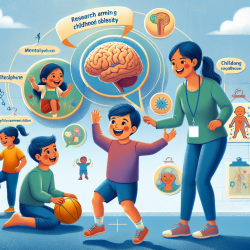Understanding the Multifactorial Effects of Obesity, Physical Activity, and Mental Wellbeing on Child Development
The recent review titled "The Developing Brain: Considering the Multifactorial Effects of Obesity, Physical Activity & Mental Wellbeing in Childhood and Adolescence" offers critical insights into how obesity, physical activity, and mental wellbeing intersect to influence child development. This review underscores the importance of these factors in the context of speech-language pathology and provides actionable insights for practitioners.
Key Insights from the Research
Obesity in childhood has been linked to numerous physiological and neurological health concerns, including mental health issues such as depression and anxiety. The review highlights that approximately half of the global population meets the criteria for at least one psychiatric disorder in their lifetime, emphasizing the need for early intervention.
Adolescence is a crucial period for brain development, during which the brain's structure and functions are particularly vulnerable to the negative impacts of obesity and mental health declines. The research suggests that physical activity can serve as a protective factor, potentially mitigating the adverse effects of obesity on mental health.
Implementing Research Findings in Practice
For speech-language pathologists, integrating these findings into practice involves a multifaceted approach:
- Promote Physical Activity: Encourage physical activity as part of therapy sessions. Activities that integrate movement can enhance engagement and support cognitive and emotional regulation.
- Collaborate with Families: Work with families to create environments that promote healthy lifestyles, including regular physical activity and balanced nutrition.
- Monitor Mental Wellbeing: Be vigilant about the signs of mental health issues in children and adolescents, and collaborate with mental health professionals when necessary.
Encouraging Further Research
While the review provides a comprehensive overview, it also highlights the need for further research into the specific mechanisms by which obesity and physical activity influence brain health and mental wellbeing. Practitioners are encouraged to stay informed about emerging research and consider how these insights can be integrated into their practice to improve outcomes for children.
Conclusion
The intersection of obesity, physical activity, and mental wellbeing is a critical area of focus for improving child development outcomes. By integrating these insights into practice, speech-language pathologists can contribute to the holistic development of children, supporting both their communication skills and overall wellbeing.
To read the original research paper, please follow this link: The Developing Brain: Considering the Multifactorial Effects of Obesity, Physical Activity & Mental Wellbeing in Childhood and Adolescence.










